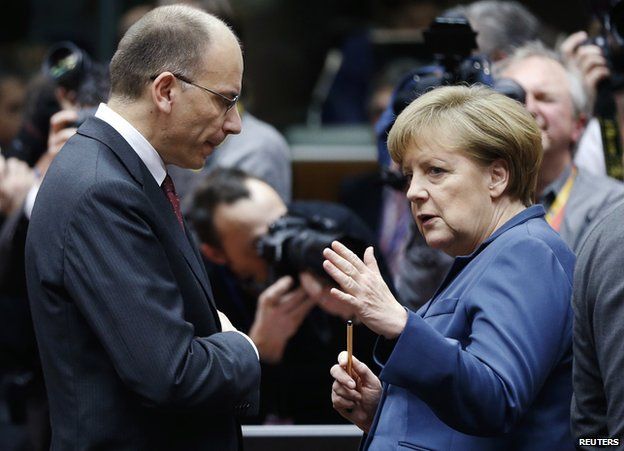EU leaders approve eurozone banking reform deal
- Published

EU leaders meeting in Brussels have given their backing to a common set of rules for managing the closure of failing eurozone banks.
Under a plan earlier agreed by finance ministers, a 55bn-euro ($75bn; £46bn) fund will be set up, financed by the banking industry, over 10 years.
The deal is aimed at building an EU banking union that should minimise the need for taxpayer-funded bailouts.
French President Francois Hollande said it would boost investor confidence.
"Now the European taxpayer, the French taxpayer won't have to pay anything if there were another financial crisis," he said.
Italy's Prime Minister Enrico Letta welcomed the move as "a big step forward".
On Thursday evening the leaders also agreed on steps to improve defence co-operation, including "the EU rapid response capabilities" and "more flexible and deployable EU battle groups". The European Commission has highlighted that there is too much duplication in Europe's armed forces.
Under the banking union plan, a new European resolution authority will be created, to decide when and how insolvent banks are to be closed.
The UK and 10 other non-eurozone economies are not part of the deal.
A resolution fund paid for by the banks themselves would gradually merge national pots into a common European fund.
The idea, says the BBC's business editor Robert Peston, is to minimise the collateral damage from bank failures.
But he says the fact that eurozone finance ministers have retained the powers to decide the fate of failing banks does not augur well for speedy action.
And the 10-year lead time will not reassure the creditors of Spain and Italy, for example, that they will not end up liable.
Moreover 55bn euros is tiny compared with the balance sheets of eurozone banks, our editor says.
EU leaders were keen to finalise a deal before new bank "stress tests" begin next year.
The European Central Bank (ECB) has been put in charge of eurozone bank supervision. The stress tests are expected to reveal that some banks are overexposed, and will require new injections of capital.
New banking union
- The first pillar of banking union will be the ECB's new supervisory body to monitor all 6,000 banks in the eurozone. Germany and some other countries want to retain their own high degree of supervision over smaller banks, which are reckoned to pose less systemic risk
- The second part is the Single Resolution Mechanism, to bail out or shut down problem banks in the eurozone
- The final pillar is a common deposit guarantee, setting an EU-wide deposit guarantee of 100,000 euros (£84,000; $138,000) maximum per saver. There will be a common rulebook covering bank accounts across the EU.
At the summit, UK Prime Minister David Cameron is expected to raise the issue of migrant workers again.
France has seen heated debate about the rules for posted workers - that is, temporary workers brought in from another EU state.
The lifting of labour market restrictions for Bulgaria and Romania next month has made the issue more acute, because of fears in some areas about "social dumping" - that is, cheap foreign workers replacing locals.
- Published19 December 2013
- Published19 December 2013
- Published28 November 2014
- Published16 December 2013
- Published15 November 2013